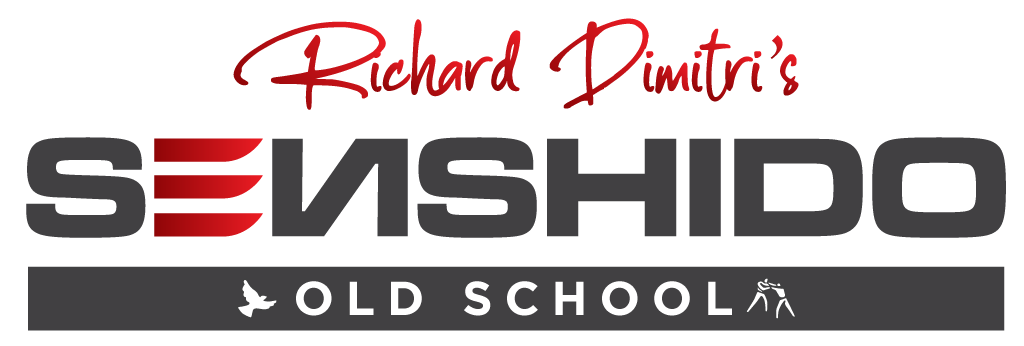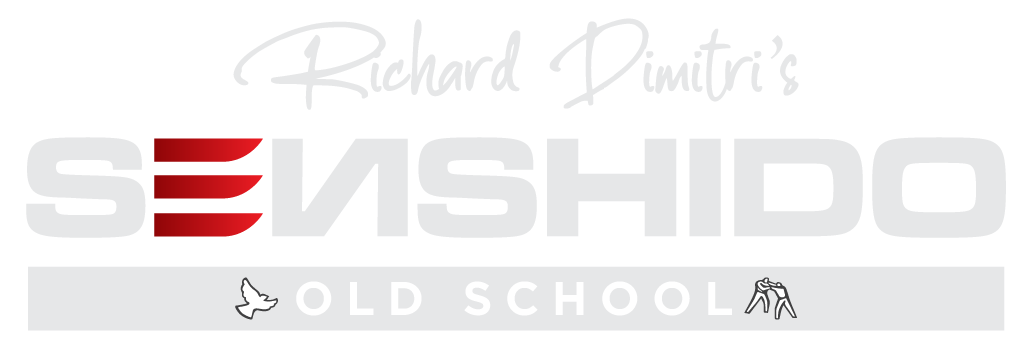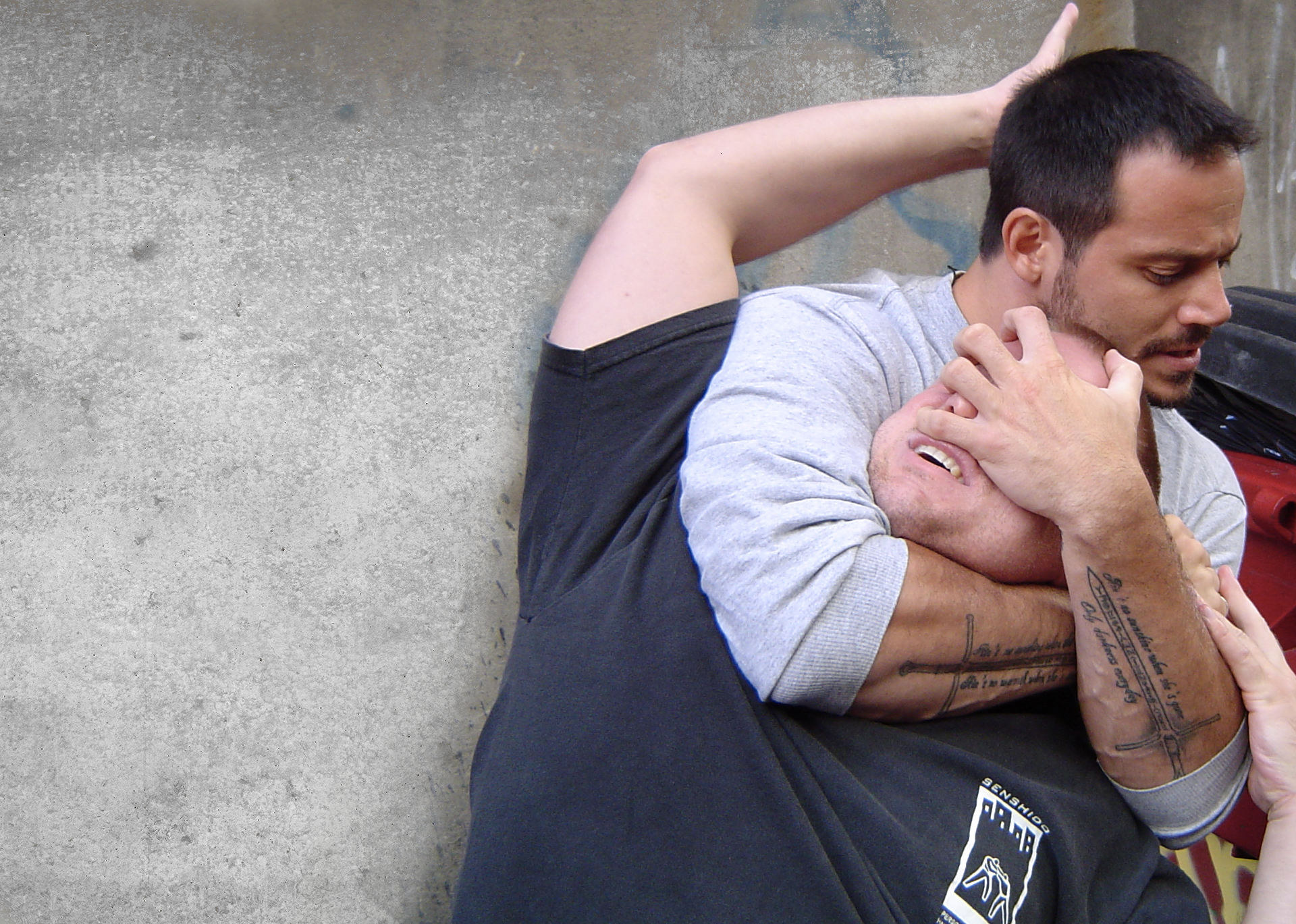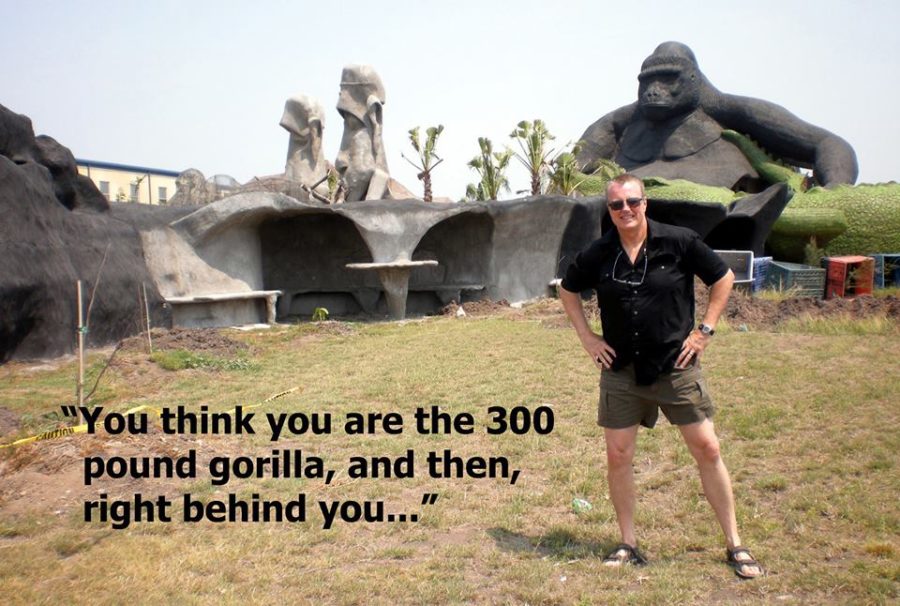Everybody just calls me Hock, even though some are still compelled to call me “sir.” And I feel uncomfortable with even that title, since I had to call numerous idiots “sir” in the military. I am a former military patrolman and investigator and a former Texas patrolman and investigator. After my retirement in 1997, I was a private investigator. I started Ed Parker Kenpo Karate in 1972 and since, I’ve done numerous martial arts and picked up a few black belts along the way. I currently teach about 40 hand, stick, knife and gun seminars in about 12 or 13 countries a year. I also write novels and non-fiction books.
Q 1. What significant change(s) on a human level, have you gone through over the last decade in direct relation to your work and how has it, if any, changed the way in which you teach/instruct?
Ten years went fast, but if I conjure up an image of myself teaching somewhere at that time, it seems like 25 years ago. Not being a very introspective person, I think, change-wise, I still hone away at material to its generic core, trying to see what and where that core could fit in the other subjects I try to pass on.
In these ten years I still try to get people to experiment through options and select their favorite 8 to 10, or 12 favorite ‘self defense” things for most of the problem-solving that fits their world. But as I age (in my 60s), I now tell people to review their list every 8 or so years to see of they can still do their favorites well enough and maybe consider some changes.
These last years though, I start all sessions off with a speech that includes, “nothing I, or we will do, will be perfect. Everything we do will have a counter.” Just to get the right mindset that we are going to exercise though a variety of options. This bit of truth gets a chuckle from some smart folks and shocks others because they think martial system “heads” and ringleaders are there to deliver “magic bullets” to all attack problems.
Q 2. Is there a particular incident/occurrence/situation you recall having directly experienced/been involved in that has deeply & emotionally touched and/or altered you and your perceptions of the world in general?
I started out in the 1970s just looking for a job that was exciting and didn’t bore me. The military and police work. There was a slow osmosis in police work, a whole collection of events from crime to car wrecks, that made me mature up and realize that police work was important. But it took awhile. And then, way too late in life, I realized how important militaries are and could be. It would be hard for me to pick one or two deep things, emotional things because so many bad things happened to me that if I try to pick one or two, my mind flips from one to the next, to the next. Ugly, ugly and more ugly. And I dislike visiting the memories, really. I don’t even want to visit the Army bases and cities I worked in, because there are so many bad memories at so many locations.
Q 3. Have you ever thought of quitting the game altogether? If yes, why? And if you were to at this stage in your life (today) do something entirely different, what would it be?
Weekly. I think about quitting weekly, but I can’t because it is my job. People will say to me:
“It must be great, traveling around the world and doing your passion. Where is your favorite place to go?” My quick answer is “home,”…and, this? This…ain’t my passion.
I do a fair number of interviews and many don’t get “published,” because my answers don’t fit their anticipated mold. One of the “moldy” questions recently was – “Martial arts. How did you first discover this passion?”
I said that that was hard for me to answer that question the way it was posed. It was hard for me to include the word “passion” in with a dead customer on the floor from a bank robbery. Or, a soldier gutted in some trench. Or a wife stabbed in the chest. Somebody’s jaw broken. It soon became apparent to the martial arts interviewer that I had a completely different view than what he perceived “passion and martial arts life” to be. So, another interview disappeared off the charts.
And I do grow impatient with people in the business. You know, now I am “60s-stupid.” I was REALLY stupid when I was in my 20s. I was still stupid, but less so in my 30s. In that progression I was 40s-stupid. Then 50s-stupid. Stupid about life and fighting. In my 60s, I am still stupid but not as stupid as I was. I know stupid and I can recognize it. I am constantly seeing and hearing stupid stuff from the various decades of ages in this business. Hearing the testosterone-driven, bad-mouthing criticisms about everyone and everything.
Quitting or not, I have an odd and unexplainable interest in…for lack of a better word, “tactics.” I don’t know why. I am like a hoarder, obsessed, drawn to the ways of fighting big and small. It is not fun. It is not a hobby. It is not a passion. It is unhealthy and I recognize that. But I’ve seen stuff and I know stuff. Next, people asked me what stuff I’ve learned. Next thing, I am teaching the stuff. Next thing, I am making more money teaching that stuff than at police work. Crazy money compared to the low-paying police job. A fool would not and could not do both. Next thing, I am teaching stuff, 40 times a year all over. I don’t really know how this happened? I didn’t plan it. I didn’t want it. I just kept moving forward week to week. Now, 18 years have passed by. I am really too old to do much else at this stage of my life, except maybe write.
Q 4. Do you feel you were proverbially ‘born’ to do what you do, that this was your calling? Is there perhaps another thing you wish you would have done instead, or believe you are just as good at and should have perhaps explored instead?
I am, I think, first and foremost a writer. Second, a detective. Third, maybe this fighting stuff? I was probably born to be a writer. It’s a music I get. I have an ear for it. And I can stand the painful labor of it all. Being a detective, not so much a patrolman but an investigator was a natural for me, both in the military and in Texas. But it was exhausting work, with a toll. Through time, I did grow very tired of people’s problems. Day after day, month and year after year, people’s problems. After 26 years I’d had enough of it. I never was a social worker type. I use to joke that victim’s were mere vessels for me to get my hands around the throats of criminals. But it was half a joke. Victims of various tragedies wore me to a frazzle.
I do wish I had just played baseball. I honestly did have potential in my teens. Imagine living your life going out on a green field everyday and playing a slow game of baseball. I really don’t like to watch baseball, but loved playing ball. Yeah. Baseball.
Q 5. How has your work affected your personal life in regards to the relationships with those outside our field/profession? (Professional, personal, familial, romantic, etc.)
Being an obsessive hoarder, I know it has. But, when I was a Texas detective for 17 years, I fit the classic stereotype. Nothing personal stood in my way when working cases. Lots of things fell by the wayside. Here these last 18 years of my traveling and teaching, my kids are grown and busy, and my wife (now 3rd which tells you something right there) is in on this business too, so we are very close and she gets the time and the effort.
Q 6. Do you have any regrets at all? If yes, which is the one that haunts you the most?
Loads. (I still have one unsolved homicide from the 1980s!) But, looking back on this particular path? I should have rejoined the Army in the Army Reserves, a few years after I got out, and had a few years in Texas policing, I should have joined the Reserves. The Army Reserves really bend over backward to get you in and keep you in and happy. It’s the Reserves! I could gotten Warrant Officer schools, CID/FBI schools, so much and in 25 plus years, jeez, Now? I would be “set” by now. Oh, I would have deployed overseas about 4 or 6 times, but at six months clips and that’s ok with me. People can retire from the Reserves. I have a retirement from the police department which is not much, and then that extra Army Reserves retirement on top to boot would have been great? Plus, I could have kept a hand in that military “game,” and contributed something to the cause.
Then of course, there are a long series of smaller regrets, -“WHY did I sell all my 1950s and 1960s comic books in the 70s? If I had simply saved them? I’d be rich!” -“WHY didn’t I train martial arts when I was in Korea?” -Baseball? Did someone mention baseball already? -on and on.
Q 7. What are your proudest moments/achievements in both your private and professional lives?
Solving some murder cases, getting convictions, are most satisfying, especially solving the “mystery” ones. So many murders are committed with easily identified, emotional suspects. But ones without this solution are way harder. A mystery. Solving these murders are the big leagues of policing. I have won those Superbowls. I have even caught a hit man, and seriously helped capture two serial killers.
Getting my second novel, My Gun is My Passport, published, and then getting an award for it was very cool. As far as the fighting business? A few small ones. I guess teaching in the one South African Police Academy was very unique. Kick boxing with, and then being able to beat one of my best, earliest and important instructors Ray Medina back in the 1980s was a personal landmark for me. I did raise two kids into functioning, adults with professional jobs. And that ain’t hay! My Knife/Counter-Knife book is a beauty, I think. The big, oversized hardcover, with over 1,000 how-to color photos. I still love the look and feel of it. Lots of work.
It is important not to let these things go to your head. Never take yourself too seriously. As Julius Caesar first said, then Patton said, “all glory is fleeting.” I believe that it’s not what you’ve done, it’s what you are about to do that makes you vital and important. Kevin Pollak, the actor, comedian, writer and director says, “if you’re waiting, you ain’t creating.” (And…all that kind of talk)
Q 8. How do your friends and family outside the industry/self defense/martial arts world view what you do for a living? What are your thoughts and feelings about it?
They think I am an oddity. I usually hide it for as long as I can. I am on a whole lot of plane flights and people, like at events and gatherings and parties and so forth, like to ask “what do you do?” If I tell people the truth? They act impressed, but like I am a freak, or super soldier, but I myself, can’t see how they could possibly believe me. I mean, if a stranger told me they did what I did, I wouldn’t believe them. So, I dodge it. I started telling people years ago I sold insurance, thinking that was boring enough, but it was a mistake. EVERYONE has insurance problems and this just lead to more and more conversation. Next, I told people that I traveled a lot, scouting locations for Long John Silver’s, for future, fast food locations. This is a going-nowhere conversation piece. A dead end. They look at you, sometimes with pity, and then change the subject.
I am not a rah-rah person about this fighting stuff, which is a huge detriment to my business, I know this. I do what I have to do to stay afloat. Now you want to talk about my books and writing? Watch out! Step back! Here it comes! I won’t shut up.
Q 9. How often do you find yourself going against what you preach and teach, after all, we’re all human, we all have our ‘bad days’ and the like; and how often are you aware of it enough in the present moment to catch yourself do you think?
Low expectations! Seriously, I don’t preach much at all. I don’t expect much of myself or other people either. If I suddenly discover an hypocrisy in my doctrine, I fix it immediately.
One professional snafu I still get in is that I still teach Filipino martial arts when requested. I don’t push the subject, but I do have a ton of time and grade in it. Parts of arts can contradict my major battle plan that I preach and teach, creating a problem, but, if hired out for the event, I sing the golden-oldies. And I realize it really is just an interest and a hobby for so many people. It’s fun, addictive and its exercise and makes people happy. The real benefits are abstract. They are interested in the history, the look and feel of it, like some people like Corvettes or the Boston Red Sox. So, I am there with a big smile on.
Q 10. What now? Where do you go from here? Where do you see yourself in 10, 20 years both on a personal and professional level?
Probably dead. What’s the average age of death? 75? I got about 12 years left. And the 70s are a rough decline, whew! I’ll fight it back, but man! I hope to be retired sooner than that, collecting all the money I sent in to Uncle Sam, and writing international, bestselling novels and non-fiction stories, made into movies, in which I will have brief cameos like Stan Lee.
But right now, I will continue to chug along. Make the gigs I promised to make. Chisel the material I am obsessed to chip away on, like the hoarder than I am. It seems like I live my life in 6 months chunks, 6 at a time. I see and worry about the next 6 month schedule more than the distant future. I worry about those 20 some-odd gigs I have to go in the next six months. What will I do? How will I get there? How will I advertise them best? What’s the best way to do all things?
Personally, in the coming years, I just want to hang out with my wife now and even more so in the future. Unless, you know, all those movie cameos keep me too, too busy.
Hock’s webpage is www.ForceNecessary.com. His email is Hock@HocksCQC.com. He currently teaches hand, stick, knife and gun tactics in about 40 seminars a year in 13 allied countries. His latest non-fiction book is “Don’t Even Think About It” Confessions and Memories of a Former Military and Texas Lawman, Private Investigator and Body Guard.





0 Comments
Leave a comment